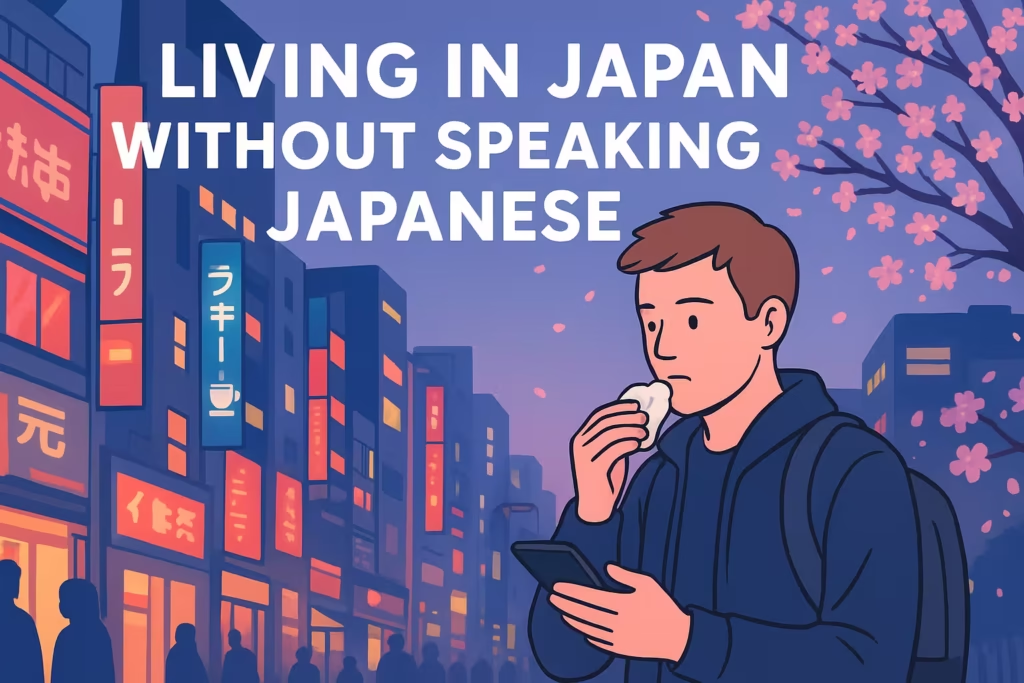🇯🇵 So… Can You Actually Live in Japan Without Japanese?
The short answer?
Yes, but not everywhere — and not forever.
When I first arrived in Japan in 2020, I could barely introduce myself in Japanese.
Ordering coffee felt like an exam.
Renting an apartment? A full-blown boss fight.
Five years later, I can say this:
You can build a comfortable life in Japan without mastering the language, especially in big cities like Tokyo, Osaka, or Kyoto — but it takes strategy, patience, and the right tools.
🏙️ 1. Where You Can Live Comfortably Without Japanese
If your Japanese skills are close to zero, choose cities that are foreigner-friendly and English-accessible:
| City | English Friendliness | Why It’s Good |
|---|---|---|
| Tokyo | ⭐⭐⭐⭐ | English menus, English-speaking staff, international hospitals |
| Osaka | ⭐⭐⭐ | Friendly locals, major expat community, relaxed vibe |
| Kyoto | ⭐⭐⭐ | Tourist hub, many bilingual part-time jobs |
| Fukuoka | ⭐⭐ | Compact, easy to navigate, growing digital nomad scene |
In rural Japan, however — even buying medicine or explaining symptoms at a clinic can be stressful. Locals are kind, but English is rare outside cities.
🏢 2. Housing: Renting Without Speaking Japanese
This is where most people struggle.
Many landlords still prefer tenants who can communicate in Japanese or have a guarantor.
💡 Tips to make it easier:
- Use English-friendly agencies like Sakura House, Oakhouse, or LeoPalace.
- Look for “foreigner-friendly” apartments on GaijinPot Housing or RealEstate.co.jp.
- Share houses are great — staff often speak English and help with paperwork.
👉 For a deeper dive, check my guide:
How to Rent an Apartment in Japan as a Foreigner (2025 Guide)
🍣 3. Daily Life & Survival Apps
You’ll be shocked at how much technology can save you here.
Here are apps I still use almost every day:
| Category | App | Why It Helps |
|---|---|---|
| Translation | Google Translate | Camera & voice translation for menus and signs |
| Navigation | Google Maps / Japan Transit Planner | Handles complex train routes |
| Food Delivery | Uber Eats / Demae-can | English interface, pay by card |
| Communication | LINE | Everyone uses it in Japan |
| Shopping | Amazon Japan / Rakuten | English options and easy payments |
| Bills | PayPay / Wise | Simple payments, no need for Japanese reading |
Thanks to these apps, you can easily shop, travel, pay bills, and even visit a doctor — all without being fluent.
💼 4. Working Without Japanese
You can find jobs in Japan even with basic or zero Japanese, but your options will be limited to certain industries:
- English teaching / conversation schools (Eikaiwa)
- IT & web development (many tech companies use English internally)
- Hospitality / tourism in major cities
- Translation / localization if you’re bilingual in another language
💡 Tip: If you plan to stay long-term, start learning basic business Japanese — it opens many more doors.
👉 Related: How to Find a Part-Time Job (Arubaito) in Japan as a Student: A Realistic Guide
🗣️ 5. The Social Side — Friends, Culture, and Connection
This is the hardest part.
Even if you work and live comfortably, social isolation can creep in if you don’t understand the language.
Most Japanese people are polite but reserved — they’ll hesitate to talk if they worry about their English.
That’s why many foreigners find friendship in international meetups, language exchanges, and coworking spaces.
🌸 Tip: Try apps like Meetup, HelloTalk, or Bumble For Friends — they’re full of open-minded locals who want to practice English.
💬 6. My Honest Take After 5 Years
Living in Japan without Japanese is like playing life on “easy mode” in some areas… and “hard mode” in others.
✅ Easy:
Ordering food, using trains, paying bills, working in international companies.
❌ Hard:
Healthcare, paperwork, making close Japanese friends, long-term career growth.
If your goal is to truly connect with Japan — even learning basic Japanese (JLPT N5-N4) changes everything.
Locals appreciate every effort, even if your grammar isn’t perfect.
🗺️ Conclusion
So, can you live in Japan without speaking Japanese?
Yes — especially in 2025.
But if you plan to belong in Japan, not just survive, start learning little by little.
Even simple words like “arigatou” or “otsukaresama” go a long way.
Discover more from Ali in Japan
Subscribe to get the latest posts sent to your email.

